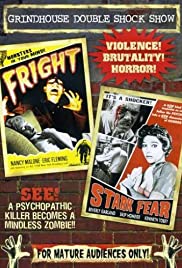
FRIGHT
US, 1956, 70 minutes, Black-and-white.
Eric Fleming, Nancy Malone, Frank Marth, Humphrey Davis, Dean L Almquist, Elizabeth Watts, Walter Klavun.
Directed by W.Lee Wilder.
Fright is a small B-budget supporting feature from the mid-1950s, capitalising on audience interest in psychology, psychiatry, issues of split personality, possibilities of reincarnation. It was directed by the older brother (estranged) of writer-director Billy Wilder. The story comes from the director’s son, Myles Wilder.
Eric Fleming plays the psychiatrist. Nancy Malone is the young woman who observes the psychiatrist hypnotising a criminal on the bridge, persuading him to be calm so that the police can bring him down. She finds herself responding to the hypnotic influence and seeks out the doctor for treatment. It emerges, under hypnosis, that she is Maria who was eventually revealed as the lover of the Hapsburg Prince, Rudolf, and died with him in a suicide pact in 1889. Under hypnosis, Ann/ Maria speaks German, is aged 18, and reveals the detail of the relationship in Vienna.
An unscrupulous journalist intrudes into the office, listens to the tapes, persuades the editor to publish stories about this situation (with a discussion with the paper’s lawyer about ethics). Ann, dismayed, disappears. The psychiatrists finds out more about her from an elderly British lady who knew her, revealing a story about Ann’s father, his relationship with a Viennese nurse.
Dramatically interesting but ethically questionable, the climax involves the psychiatrist hypnotising the criminal so that he believes he is Prince Rudolf, setting up a meeting between him and Ann/ Maria, reliving the suicide pact, shooting (blanks) at Ann, with the trauma bringing her back to normal.
An interesting look at psychiatry and psychological states with the hindsight of the 21st-century.
1. The title? The work of the psychiatrist? Hypnosis? Issues of schizophrenia? Reincarnation? Dealt with on a popular style from the 1950s?
2. New York settings, streets, the bridge, homes, the psychiatrist’s office, police precincts, the prison? Musical score? Atmospheric?
3. The opening episode, the man on the bridge, the public watching, the role of the police, trying to bring him down? The intervention of Dr Hamilton? The microphone, his persuasion, the hypnosis? The police bringing the man down? His background, criminal, Dr Hamilton going to interview him?
4. Ann, in the taxi, wanting to get to the airport, fascinated by the hypnosis, her own hands clenching and unclenching? Her going to see the doctor, her insistence, his seeing her? The professional relationship? The sessions, the hypnosis, his recording the interviews? His attraction towards her?
5. Ann’s story, her not remembering, the split personality, the historic character, Maria, the different personality, 18, Vienna, Prince Rudolf, the Mayerling episode? The historical reality?
6. The German, and not knowing German, never going to Vienna? Maria and her disliking Ann, disliking being interviewed? The hiding of the handbag behind the curtain?
7. Dr Hamilton, spending time with Ann, the picnic, the discussions, falling in love?
8. Dr Hamilton, Professor Gore, his friendship, the discussions about history?
9. The journalist, intruding into the office, listening to the tapes, the discussions with the editor, the lawyer and ethics, transcribing the tapes, the newspaper headlines and story? Dr Hamilton’s reaction? Ann’s disappearance? And the police suspecting him of murder?
10. His going to visit Ann’s house, Lady Olivia, her British style, eventually telling the story, Ann’s devotion to her father, his relationship with her Austrian nurse, absorbing this history and Mayerling?
11. Dr Hamilton, the plan with the police, with the warden, with the journalist? His hypnotising the criminal? Implanting the speech about his being Prince Rudolf? The newspaper headlines? Ann/ Maria’s return?
12. The episode with the prisoner, Ann/ Maria and her wanting to meet him? The hypnosis, his talking to her as Prince Rudolf, her response, the suicide scenario, her wanting to die first, the gun on the table, the criminal firing, the blanks?
13. The episode, bringing Ann to her senses? Maria dying?
14. An interesting 1950s exploration of psychological themes? Credibility and plausibility? Looked at in hindsight?